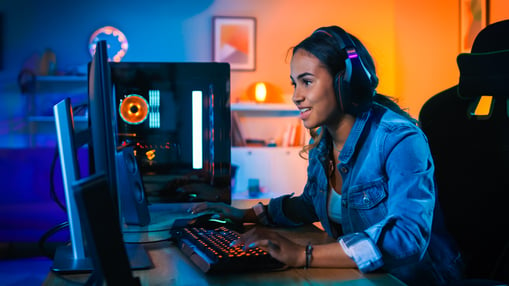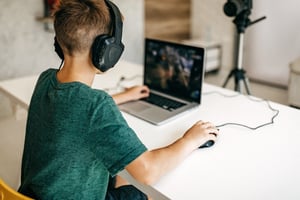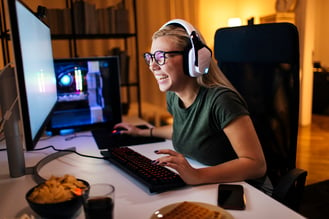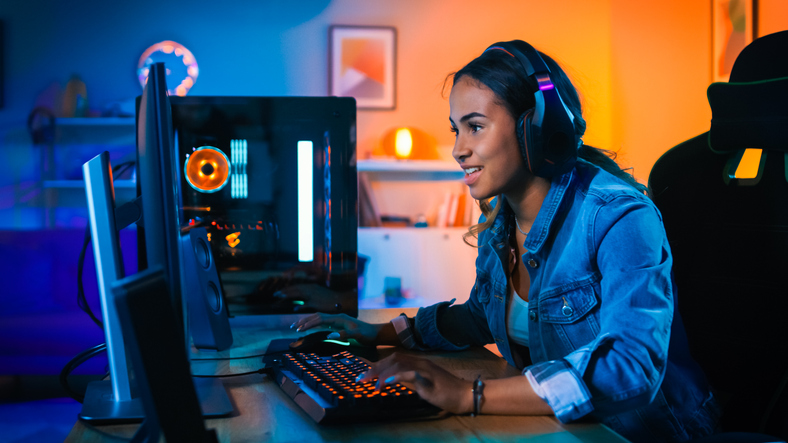Autism, Gaming, and Building Social Skills
10 Ways to Build Social Skills Using Online Gaming for Autistic Teenagers
Online gaming has been shown to improve social skills in autistic teenagers. It is estimated that more than 41% of autistic adolescents spend the majority of their leisure time playing video games, versus 18% of neurotypical peers. Social interactions don’t always come easy for autistic teenagers. They may lack social initiation, experience challenges connecting socially, and have difficulty reading common social cues. Struggles in navigating social situations can lead to a lack of confidence, bullying, and isolation. “Theory of mind” is the ability to infer others’ thoughts and feelings in social settings. Autistic teenagers can use online gaming as a way to practice communication, build meaningful relationships, and boost their theory of mind. Gaming offers fun, low-stress environments for teens to build their social skills!
Here are 10 ways to build social skills using online games for teenagers with autism:
1. Online Etiquette
Online etiquette, often known as “netiquette,” is important because it makes sure everyone treats one another with respect online. Online etiquette and in-person etiquette are the same. However, when online, it can be easier to say things you don’t mean or give out too much information. Oftentimes, online gaming platforms monitor messages and will flag inappropriate or mean language. Learning and practicing proper online etiquette translates to proper social etiquette offline. Everyone should respect others, be honest while maintaining privacy, and think before hitting “send.” It’s important to remember that if you wouldn’t say it to someone’s face, you shouldn’t say it online.
2. Communication
Many online gaming platforms allow users the opportunity to connect and collaborate with other players from around the globe. Players must communicate with one another and participate in reciprocal conversation to solve common tasks in the game. Many online interactive games allow users to converse while they play. Through playing an online game, teens may feel less social pressure as they communicate specifically about the game with others. As they feel more comfortable, gamers may begin to engage more in casual conversation with other players.

3. Visual and Auditory Cues
For autistic teenagers, recognizing and understanding visual and auditory social cues does not come easily. Online gaming offers virtual environments where players must pay careful attention to visual and auditory clues. While the games are more predictable than real-life situations, they allow teens the opportunity to practice picking up on subtle visual and auditory cues.
4. Turn-Taking
In real-life situations, turn-taking is an important social skill that comes up often: waiting in line at the grocery store, participating in a group, and when playing with others. In many online games, players must work together to complete a common task. Frequently they have to take turns while playing. Turn-taking is an important component in communication skill development as children learn not to interrupt others and wait for their turn to speak.
5. Problem-Solving
Problem-solving skills are constantly needed in social situations. Adolescents may encounter situations where they need to be flexible, accept unaccepted conversations or situations, and analyze the situation to come up with an appropriate response. Online gaming constantly requires players to problem-solve and make quick decisions. Gamers must adapt to new levels and challenges. Through online gaming, teenagers learn to think quickly and problem-solve when challenges arise.
6. Motor Skills
 Some autistic teenagers require support in developing motor skills. Gaming is a simple way to improve fine and gross motor skills. Manipulating a handheld controller is a way to refine fine motor skills and hand-eye coordination. Virtual reality or full-body games, like a dance or fitness game, is a way to improve gross motor skills. In improving motor skills, teenagers may feel more confident as they interact or play games with peers, encouraging social interactions.
Some autistic teenagers require support in developing motor skills. Gaming is a simple way to improve fine and gross motor skills. Manipulating a handheld controller is a way to refine fine motor skills and hand-eye coordination. Virtual reality or full-body games, like a dance or fitness game, is a way to improve gross motor skills. In improving motor skills, teenagers may feel more confident as they interact or play games with peers, encouraging social interactions.
7. Building Friendships
Online gaming offers a world of friendships. Gaming is often interactive, so users can play and talk with friends from all over, meet new people, or play together in person. Teens may also connect with others who share a common interest in the game and bond over conversations about the game. There are even conventions that celebrate gaming and different characters in the world of gaming, which is a wonderful way to connect with others who share the same hobby!
8. Navigating Teasing and Bullying
With anonymous, online interactions, there is always a possibility that teasing, harassment, or bullying may occur. These are situations that can also occur in real life as well. As teenagers learn online etiquette, they must understand how to deal with unwanted situations that may occur. Most games offer muting, blocking, and reporting settings if someone is acting inappropriately. However, it is also important to discuss with your child how the behavior made them feel, and strategies to deal with upsetting situations when they inevitably encounter bullying whether in real life or online.
9. Lifelong Impact
 Building a network of friends and peers in the online gaming world is powerful. Teenagers may build a network of people with different backgrounds from all over the world. As life goes on and teens move to different places, go on to different schools, or enter new jobs, they may continue to keep in touch with people they’ve met through online gaming and find connections with others in their future endeavors.
Building a network of friends and peers in the online gaming world is powerful. Teenagers may build a network of people with different backgrounds from all over the world. As life goes on and teens move to different places, go on to different schools, or enter new jobs, they may continue to keep in touch with people they’ve met through online gaming and find connections with others in their future endeavors.
Online gaming may also inspire educational and career paths. Depending on the game, some individuals become interested in learning about design, coding, and problem-solving. This can lead to teens pursuing education or careers in STEM (science, technology, engineering, and math). Online gaming may provide the necessary background and confidence that teenagers need to seek new challenges in different contexts.
10. Find Your Community!
Feeling like part of a community is important for one’s confidence and sense of belonging. Online gaming offers communities for different people based on age, ability level, and interests. One popular free online game, Minecraft, offers a server specifically for autistic players. “Autcraft” is for teenagers over the age of 15. It’s a community for individuals who may share common challenges and interests to connect in a safe environment. Autcraft also provides additional protections to users when it comes to speech, harassment, and negative online behaviors for individuals who may still be working on their social skills around online etiquette. The ability for players to find belonging in a particular community is a powerful opportunity for social skills to skyrocket as they navigate their new spaces and friendships.
 Scratch, an online game developed by the MIT Media Lab teaches coding skills for young people ages 8 to 16. For autistic teens, it can be an accessible way to start learning basic coding and can also involve programming your own interactive stories, games, and animations to share with others in the Scratch community. As a learning game, scratch is a great way for children and teens to learn coding and interact with a supportive community.
Scratch, an online game developed by the MIT Media Lab teaches coding skills for young people ages 8 to 16. For autistic teens, it can be an accessible way to start learning basic coding and can also involve programming your own interactive stories, games, and animations to share with others in the Scratch community. As a learning game, scratch is a great way for children and teens to learn coding and interact with a supportive community.
Online gaming is a fun, interactive, and free way for autistic teenagers to build their social skills. Gaming provides opportunities for a variety of skills to be learned and practiced in a relaxed, leisurely way and is a unique way for teenagers to connect socially.
This article is based on the following research and information sources:
https://www.madisonhouseautism.org/video-games-and-autism-helpful-or-harmful/
https://www.crucial.com/blog/gaming/gaming-on-the-autism-spectrum
https://www.aane.org/video-games-benefit-students-special-needs/
https://www.sciencedaily.com/releases/2019/10/191001102218.htm





